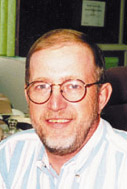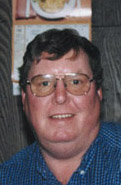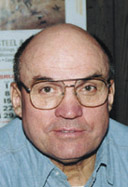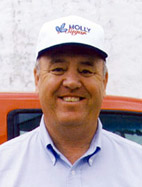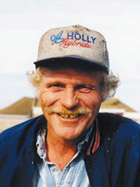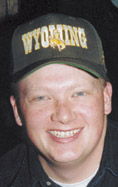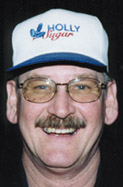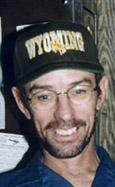|
By Lois Kerr
"To many growers, the ag department is Holly Sugar. We are the main contact with the growers," comments Russ Fullmer, agriculture manager. "We strive to give the best possible service to the growers, as well as get high quality beets to the factory for processing." The ag department has complete responsibility for the entire agricultural aspect of the Holly plant. The ag crew must contract the required number of sugar beet acres each year, maintain field records and histories, distribute acreage and monitor beet growth and quality. These monitoring duties necessitate checking fields regularly and visiting with, and assisting, individual growers throughout the growing season. The ag crew also arranges the schedules at harvest time, coordinates grower beet deliveries to the receiving stations, maintains receiving stations and equipment in good working order and repair, and oversees the entire beet harvest. Responsibilities don't end with harvest, however. The ag crew continues to work all winter. They have the responsibility of scheduling the haulage schedule for Transystems, achieving the correct mix of beets for factory production, and ensuring the beets arrive as needed at the factory. Besides monitoring the rehaul schedules and ensuring beets arrive at the factory promptly and in the best possible condition, ag crew members attend meetings of all sorts, keep abreast of new trends and applications in the beet industry, and continue to educate themselves in all aspects of sugar beets and the sugar beet industry. Contracting begins again in late winter, starting the cycle again with another growing season. Every agriculturist at the Sidney factory has a rural background, rural connections and understands the rural way of life. "That's what we are," Fullmer says. "We're all born and raised on a farm, and we all understand rural problems. If someone doesn't understand agriculture, or can't relate to rural people, you won't find that person in the ag department." He continues, "An agricultural background is a requirement of the job. Agriculturists must know the walk and speak the language." Each one of the five agriculturists works in his own assigned district. This allows an agriculturist to learn to know the individual families in his district, and learn the particular problems facing both the individual families and the district as a whole. Agriculturists strive not to neglect any grower within their particular district. Agriculturists also exchange ideas and information with growers on an on-going basis. "Growers come up with good practices, and we help pass these ideas and innovations along to the other growers," Fullmer remarks. "Our whole focus is to give the best possible service to each individual grower." Fullmer points out that agriculturist duties have changed over the years. In the early days of the Holly Sugar operations in the area, agriculturists measured a lot of individual fields. These measurements verified grower payments to the migrant workers. The agriculturists also supplied the labor for the growers by maintaining labor camps and sending individual recruiters to Texas to obtain enough field hands for the growing season. Agriculturists spent a lot of time supervising and working with laborers. Holly Sugar also supplied the fertilizer for growers. Agriculturists had the responsibility of distributing this fertilizer to individual growers. However, some duties remained the same through the years. Agriculturists have always contracted beet acres with individual growers, managed the harvest and as representatives of Holly Sugar, acted as liaison people between the growers and factory personnel. The ag department, aware of the sometimes different needs and problems that face both the factory and the growers, has always worked to keep both growers and factory personnel in touch with each other's needs and problems. "Good or bad, the ag department takes the brunt of what comes," observes Fullmer. The ag department has modernized in the past few years with new computer equipment. With the use of computers to better collect and study information, the ag crew can make recommendations and decisions in a more timely manner. Use of new equipment such as field weather stations and hobo units has also helped department members determine more quickly and accurately the potential for disease problems, such as Cercospora. The ag department works hard year round to provide the best and most up-to-date information for growers, and to ensure that the factory obtains the highest quality beets possible for processing. In the 75th campaign year, Fullmer had eight staff members: five agriculturists, two mechanics who worked in the ag shop, and one clerk. Agriculturists Kerry Rasmussen and Randy Jones managed the Sugar Valley District. Agriculturist Larry Riggs oversaw the Sidney factory district. Mike Vandel worked at both the Savage District and the Culbertson District, and Ed Heinle had charge of the Powder River and Pleasant View Districts, both located west of Glendive. Clerk Jackie Moran handled the office work. Mechanics Brent Coon and R.C. Hord worked in the ag shop. |
